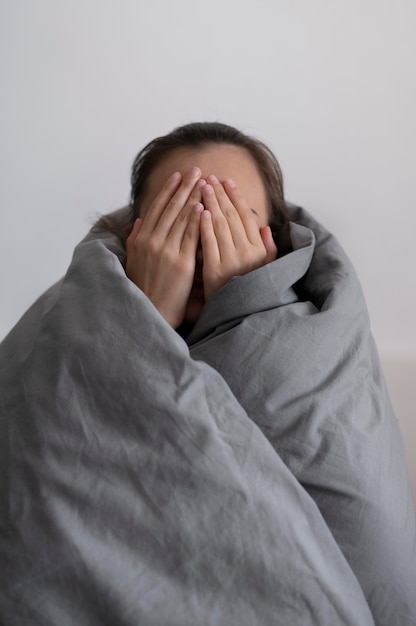
Feeling a bit blue this winter? You’re not alone; it might be seasonal depression. Many people find winter quite depressing. Here are some natural tips to help you combat seasonal depression and lift your spirits – summer will be here soon!
Seasonal depression, also known as Seasonal Affective Disorder or SAD, tends to hit harder during the winter months. People with SAD often feel down during the cold and dark season but feel more like themselves come summertime. While severe cases may need medical intervention, mild cases can often be managed with natural remedies. Here are some tips to help you tackle seasonal depression naturally!
The primary cause of SAD is the reduced amount of natural light exposure during winter. Since it’s colder and we spend more time indoors, especially if you have an indoor job, you might not see much sun during the day. To counter this, try opening curtains and blinds to let sunlight in as much as possible. You can also install skylights or trim tree branches that block your windows. Letting in more light could be one of the most effective ways to beat seasonal depression naturally.
If you’re still not getting enough sunlight, consider using a lightbox. Lightboxes emit a different type of light compared to regular indoor bulbs. Experts suggest sitting in front of a lightbox for 30 minutes each morning. An alternative is a dawn simulator, which gradually increases the light from a bulb to help regulate your sleep cycles and circadian rhythms.
Because weight gain can be associated with SAD, it’s crucial to get outside and exercise whenever you can. Jogging, playing in the snow with children, or walking a dog are all excellent options. If it’s too cold to be outside, head to the gym and work out near a window to soak up some natural sunlight.
Staying active and caring for your body plays a big role in feeling better naturally. Another great tip to fight seasonal depression is to spend time with animals. Interacting with pets like dogs and cats can release feel-good hormones like serotonin and prolactin in your brain. If you have a pet, make sure to spend quality time with them daily. If not, see if you can play with a friend’s pet or even volunteer at an animal shelter for some furry companionship.
If you’re feeling particularly down, find a creative outlet to express your emotions. Whether it’s painting, writing, playing an instrument, or journaling, doing something artistic can improve your mood by giving you a sense of accomplishment and helping you stay motivated and focused.
Sleep is also essential for your well-being. Both your mind and body function better when you are well-rested. The amount of sleep you need can vary; some people feel fine with seven hours, while others need more. If you feel groggy during the day, a short nap might help. If falling asleep is challenging, consider using sleep aids and try to establish a regular sleep schedule with reminders and alarms.
If these strategies don’t provide enough relief, natural supplements might help. Melatonin can regulate your sleep cycles, while St. John’s Wort has been used to treat depression. Omega-3 fatty acids, found in fish oil, are also good for combating depression in moderation. Consult with a local apothecary or pharmacist to find other natural herbs and supplements that can make you feel more alert and energized. Sometimes, a new type of morning tea can make a difference.
If natural methods aren’t alleviating your depression, it’s important to consult a doctor or a professional. These experts can offer talk therapy, medications, and other treatments to help you feel better. Getting the right treatment, whether natural or professional, is crucial for returning to your usual self instead of waiting for summer to arrive again.